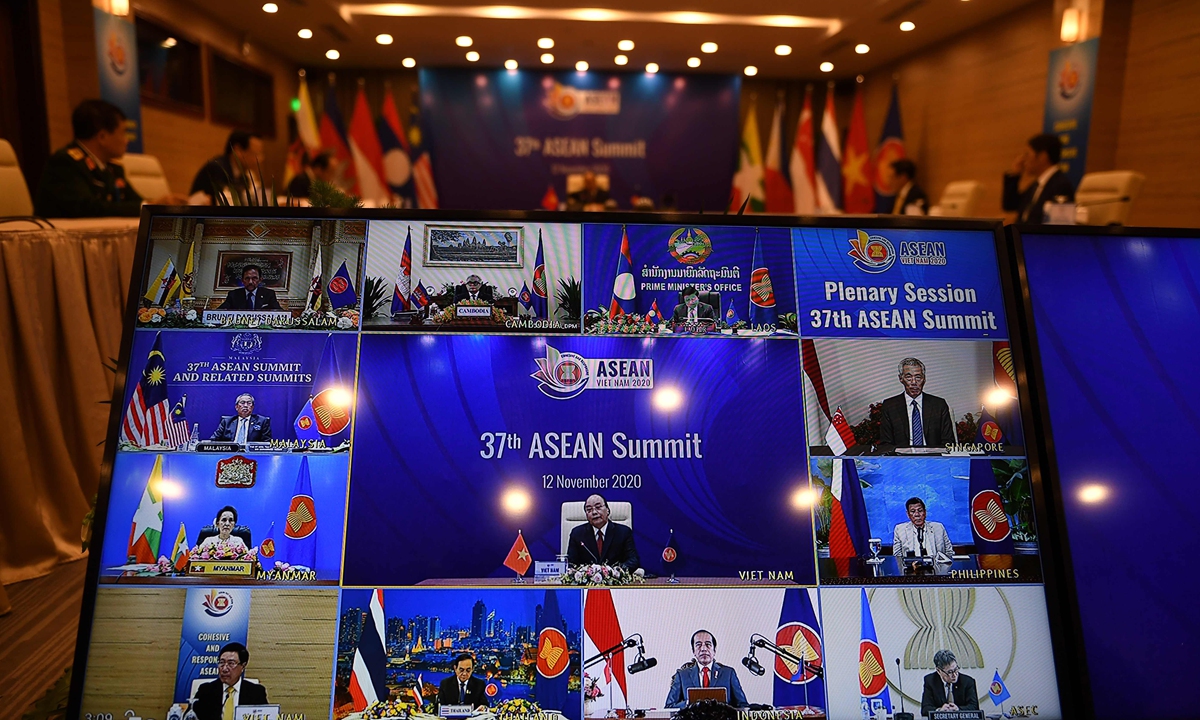李开盛,上海社会科学院国际问题研究所副所长、研究员

Photo: VCG
The US under President Joe Biden's administration clearly attaches greater importance to Southeast Asia than the Donald Trump's administration did. The Southeast Asia region is complex in many ways, and these complexities are very much at odds with Trump, who had a straightforward and even exaggerating ways of behaving.
So far, no specific document on Southeast Asia policy has been released by the new US administration. But the signal - the US paying attention to Southeast Asia - is clearly visible. In the US Interim National Security Strategic Guidance, released on March 3, the Biden administration emphasized the importance of US partnerships with Singapore, Vietnam and other Association of Southeast Asian Nations (ASEAN) members. Moreover, US aircraft carriers, a symbol of its hegemony, are now gathering in the South China Sea. The US also had a strong reaction to the Myanmar situation in February, and has imposed sanctions against Myanmar's military leaders and entities.
The only problem is, the complexities of Southeast Asia may not be able to be dealt with through aircraft carriers, the so-called democracy as well as sanctions. The South China Sea issue can be better handled only in closed-door negotiations, not on the deck of an aircraft carrier. Some Southeast Asian countries have developed during these years because of political stability and their determination to achieve prosperity, rather than a belief in democracy. Many regional countries have now realized that it is more important to focus on good economic and social governance than to rigidly copy Western democracy. This can be seen in lessons of many poor countries which had been imitating the West, as well as in the experience of economic development in countries like Singapore and Vietnam.
From this perspective, the US needs to show more humility when dealing with countries that are politically and culturally different from it. As Kishore Mahbubani, Singapore's former ambassador to the UN, said in an interview with National Public Radio on March 2, it's time for the US to approach Asia with some degree of humility and to learn to deal with Southeast Asia, deal with imperfect regimes and imperfect compromises, because this produces peace and stability.
However, two factors are hindering the Biden administration from understanding the complexities of Southeast Asia and adopting a humble attitude. One is Biden's overemphasis on the strength of US democracy and his overconfidence in the US as the beacon of the free world. For the Biden administration, democracy and human rights are important tools to regain US soft power and restore its world leadership. But whether or not this policy benefits countries in Southeast Asia is often overlooked by the cultural arrogance behind this policy.
Second, the fundamental purpose of Biden's Southeast Asia policy is to serve Washington's need to strategically compete with Beijing, rather than to solve problems based on the situation of the region or any specific country. For example, while China and ASEAN were negotiating a code of conduct in the South China Sea, the US sent aircraft carriers to the regional waters, cautioning ASEAN members to be wary of China's demands. As the gap in economic and military power between China and the US narrows, the US strategy toward China will probably rely more and more on taking advantage of third-party forces, and ASEAN is the one the US hopes to use as a helping hand.
According to a report released in February by Singapore-based think tank ISEAS-Yusof Ishak Institute, Southeast Asia's trust in the US has grown after Biden won the presidential election. But if the Biden administration has no better strategy than imposing sanctions on regional countries (including Myanmar), or sending aircraft carriers to add fuel to the fire of South China Sea disputes, Southeast Asia's expectations are likely to be quickly replaced by disappointment.
There is still the possibility of cooperation between China and the US in Southeast Asia. For example, in the case of Myanmar situation, if the two sides can turn their rivalry into communication and coordination, Beijing and Washington can in fact find common interests in stabilizing the situation there, and even find a solution together. However, if the US simply sees this as a new battleground to suppress China's influence or even to counter China's rise, a new round of confrontation between the two countries will emerge. Nor will there be peace and stability in Southeast Asia anymore under a fierce contest of the two great powers.
The author is research fellow and deputy director at the Institute of International Relations of the Shanghai Academy of Social Sciences. opinion@globaltimes.com.cn